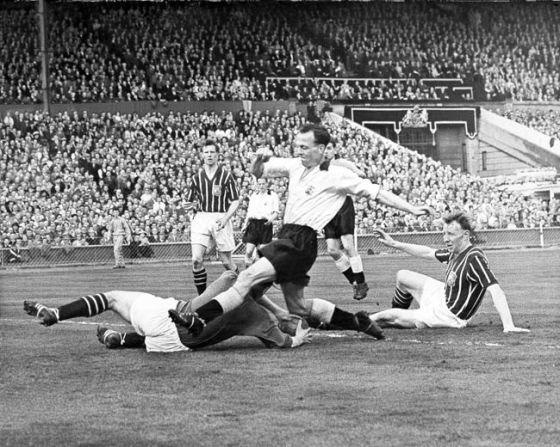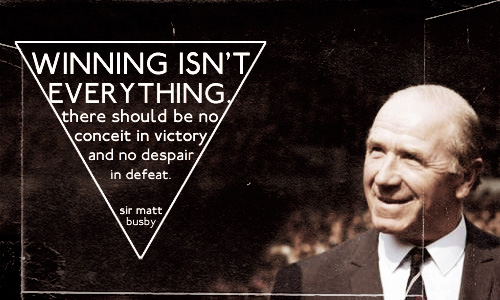The story of war is that of nations, but the stories of war are those of individuals
Noted journalist and author Ulrich Hesse-Lichetenberger quoted the aforementioned lines to delineate how the breakout of a macabre war failed to douse the spirit amongst certain aspiring German footballers and how their lives changed forever, for good as well as for bad.
A player of Helmut Schön’s stature, who later led Germany to the final of World Cup 1966, was deemed unfit to take part in the war(in the beginning that is to say) owing to his chronic knee injury and had it relatively less difficult than a few of his colleagues during wartime.
Adolf Urban, a member of the Breslau Elf and of the all-conquering Schalke team of the ‘30s and ‘40s, whose last contribution to football was participation in the final of Tschammerpokal in 1942 where Schalke lost 0-2 against 1860 Munich, never left Stalingrad alive.
However, there was one footballer who tasted both bitter and sweet pills of the war. A footballer who became the first ever German to play in an FA Cup final, the first foreign winner of FWA Footballer Of The Year Award(1956), a footballer whom legendary Lev Yashin described with the following words
There have only been two world-class goalkeepers. One was Lev Yashin, the other was the German boy who played in Manchester
His name was Bernhard Carl Trautmann.
A Bremen native, Trautmann started his short football career with Tura Bremen. Owing to the great depression, his family shifted in the neighborhood of the working class locality of Gröpelingen. Trautmann, a sports enthusiast, enlisted to the cause of YMCA and later just like other kids of his age group, Trautmann enrolled himself for an erstwhile facet of Hitler Youth, the Jungvolk.
When war broke out, Trautmann served to its cause and at first served as a motor mechanic. Later on he joined the Luftwaffe as an intern radio-operator first and then as a paratrooper. He was soon drafted out to the eastern front, first in Poland and later in Ukraine. There his unit of thousand men had the primary objective of disrupting the supply of ration for the Soviet Army.
The unit initially executed the objective to an extent. But an early onset of winter and the opposition’s counter-offensive measures left this unit in disarray. And only three hundred men of the actual unit were left. Trautmann’s contributions were acknowledged and he was rewarded with five medals including an Iron Cross. He was also promoted to the post of a corporal.
Soon he was promoted to a sergeant and relocated to the western front to negate the advances of the Allied forces. He survived the bitter house-to-house gun fighting that took place in the battle of Arnhem in The Netherlands. During this period, Trautmann also endured the absolute deprivation for three days under the rubble of a school building, with only his right arm in a movable condition and an entire regiment of dead compatriots as companions.
The rescue party saved him from that open crematoria and gratuitously threw him into another inferno, to the battle of Bulge through the densely forested Ardennes mountain range, to give shape to operation “Watch on the Rhine” so as to safe-guard the receding western front.
Surviving a slew of inenubilable circumstances he landed in the hands of the British army and was detained in Belgium. Later on he was transferred to England in a prisoner-of-war camp.
Football was one of the recreational activities in the camp and Trautmann was a regular outfield player. Once during a game against a local side Haydock Park, Trautmann injured himself and swapped position with the goalie, Gunther Luhr. That was indeed the beginning of the most unexpected twist in the tale of the quondam Nazi.
Alongside working on farms, bomb disposal squads or building roads to an airport, Trautmann started taking his love for his hobby of goalkeeping seriously and was soon found representing amateur club St.Helen’s Town. In a year his ability with the gloves started earning him accolades and rumor has it that a crowd of 9000 assembled in the final of a local competition, Mahon Cup, to witness Bert’s (Anglicized version of Bernd) goalkeeping.
And an unheralded development took place the very next season. Several first division sides were reportedly interested in acquiring his services. Manchester City were the first club to come calling with a contract offer in hand and the German could not say no to that. That was the beginning of a bond that lasted for over 15 years (1949-1964) where Trautmann played 545 professional games for the club, winning the FA Cup once.
The start to his first division career was not a partie de plaisir. There were two reasons behind that – 1) He was replacing Frank Swift, a club legend who retired the previous season. So, expectations were high and 2) His Luftwaffe background created furor amongst the fans. A certain section of the fans, including the Jewish groups, were vocal against his signature-selection-participation and threatened to boycott games. They jeered him from the terraces, put up demonstrations and flooded the club mailbox with hate mails targeting Trautmann.
Under such circumstances it would have been difficult for any footballer to keep his composure and with Trautmann it was no different. He displayed an inspired performance in his debut game against Bolton. But his concentration soon gave way to the protestations and Manchester City conceded seven goals against Derby County in a league game.
In January, 1950, Manchester City travelled to London to play Fulham. The city bore the result of the Luftwaffe’s many attacks and the fans from both sides greeted him with hatred. Manchester City were not playing particularly well at that time and were staring down the barrel for a humiliation. But the fighter in Trautmann refused any further personal capitulation.

The day when protests turned into admiration.
His side lost the game 1-0, but he won the hearts back by pulling off save after save to keep a respectable losing margin. While leaving the pitch at the end of the game, Trautmann received a standing ovation. After the game he attended a long autograph session with the fans. When asked why he entertained the fans despite the ill-feelings, he remarked that he received so much forgiveness and friendship therefore he wanted to give something back and prove that there are good Germans. Trautmann then went onto play 245 of the next 250 Manchester City games at a stretch.
Within two seasons Manchester City embraced a tactical approach, Revie Plan, an inspired version of the tactics with which Hungary mutilated England 6-3 at Wembley. Using that system, Manchester City reserves remained unbeaten for 26 games and soon coach Les McDowall introduced the senior team to this tactical variation.
The system would revolve around Manchester City’s forward Don Revie who would play in a deep-lying center-forward’s role, dropping deep to receive the ball to attract opposition defenders and use the space left by them to channel the attack. Trautmann literally had an important hand to play in this strategy. Trautmann closely followed the Hungarian goalie Gyula Grosics’s role in this strategy for Hungary. Instead of carrying out long goal-kicks, his job was to pick out a pass for the center-half or wing-half. His past experience with Handball helped him direct long throws towards his wing-halves Ken Barnes or John McTavish, thus putting the Revie Plan in motion.
Manchester City’s tactical éclat brought about an improvement in the club’s stature. In 1955, the Citizens played in the final of the FA Cup against Newastle United and Trautmann became the first German player to play in an FA Cup final. The Citizens lost 3-1. The next year they finished fourth in the league. Because of his immense contribution, Trautmann won the FWA Footballer of the year, the first goalkeeper to win it. This boosted his confidence and inspired Man City to win the FA Cup, defeating Birmingham City 3-1.
Trautmann was nonpareil in his position in the team. The Luftwaffe’s training played an important role in the German’s fitness, reflexes and acrobatics. His experience in Handball helped him contribute to the team’s attacking movements through long throws. He was particularly good at shot-stopping. So much so that legendary Sir Matt Busby once remarked in a pre-match conference, when asked about the man who saved 60% of the penalty-kicks in his life,
Don’t stop to think where you’re going to hit it with Trautmann. Hit it first and think afterwards. If you look up and work it out he will read your thoughts and stop it.

The save that went into the history book
Trautmann’s finest hour came in the FA Cup final of 1956. After Man City were up by 3 goals to 1, the Citizens were stretched by Birmingham City. 73 minutes on the clock, Trautmann made a one-on-one stop by diving into approaching Peter Murphy’s legs. Trautmann won the ball but a collision of his neck with Murphy’s right leg knocked him unconscious on the field. Since no more substitutes were permitted, Trautmann had to continue the remaining agonizing minutes in a feat of dizziness. He managed to pull out a slew of saves in the dying moments to keep it 3-1 to help his side win the FA Cup.
A few days later, Trautmann went to Professor David Lloyd Griffiths, an orthopedic surgeon at Manchester’s Royal Infirmary, to find a remedy for the growing discomfort in his neck. The X-ray revealed that five vertebrae were dislocated in his neck, the second of which was broken and if the third one had not wedged against it, he could have died on the field or even later. Thus, the save became the greatest ever save in the FA Cup, a save which could have cost Trautmann his life.
Despite his growing reputation worldwide (Schalke urged to sign him but Man City did not budge), Trautmann never represented Germany. In a meeting held with the legendary Sepp Herberger, he was told that the coach was primarily looking for a player playing in the German league only. Moreover, the political implications surrounding Trautmann’s involvement with the Nazis was another reason why Herberger chose not to select him for the Mannschaft.
His testimonial match too was a fitting farewell gift to his ceremonious service to the club. He captained a combined Manchester side which included Manchester United legends Bobby Charlton and Denis Law against an English national team which included the likes of Tom Finney and Stanley Mathews.
Post retirement, he engaged himself with DFB’s project of aiding countries without national football structures. In his first assignment as a coach, he helped Burma qualify for the Olympics in 1972 and also helped them win the President’s Cup. Before bidding farewell to all forms of football in 1988 Trautmann trotted to and from places like Tanzania, Yemen, Pakistan, Liberia for various developmental work.
Sir, you have earned our respect. May your Legend hold strong against the ravages of time.
~Written by Arnav Bose for ‘The Hard Tackle’, editing and additions by Late Night Kickoff.




